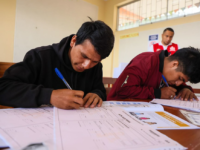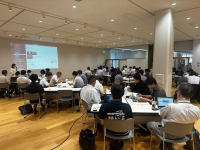Digital Transformation Co-Creation Platform enables national and local governments to co-create policies and services through knowledge sharing and mutual learning. In Japan, diverse knowledge and challenges exist across about 1,780 local governments but are not adequately shared due to hierarchical communication structures. Digital Agency has developed a co-creation ecosystem where government officers nationwide can engage in open, flat, and two-way communications as individuals.
Innovation Tag: Process Facilitation and Co-design
Case Study
Protected: Solución de Soporte Tecnológico para el Escrutinio (SST) con Certificación Digital…

The Technological Support Solution for Scrutiny(TSS),developed by ONPE, modernizes Public Management and Digital Government. During elections,poll workers manually fill out multiple official records. The TSS digitalizes votes and produces printed records, simplifying their task. The results are encrypted and securely transmitted to the central office, speeding up their delivery. Additionally, digital certificates were introduced for electronic signatures, giving legal value to the generated PDFs
Case Study
High Impact Service Provider Case Study: Innovating the Individual Assistance Program For Survivors…
The Federal Emergency Management Agency (FEMA), a component of the United States’ Federal Government, has fully reimagined its DisasterAssistance.gov website to make applying for disaster assistance faster than ever. This change will reduce time burdens for survivors post-disaster, when they are in greatest need and the most overwhelmed. This effort has been built on decades of feedback from disaster survivors and is expected to reduce the registration time by more than 15%.
In the U.S. government, community members have experimented with designing the government services they will use. Their lived experience improves service outcomes, builds better relations with the government, and creates greater ownership over the service. This is new; normal participatory design of government services just includes community members for certain activities at certain points, never throughout, and never allowing the community to lead and frame the project or choose methodologies.
Zaragoza City Council has launched a new electronic citizen participation platform with the aim of involving its citizens in public policy decisions and in the design of its services. It provides an interactive space for residents to actively contribute, strengthening the collaboration between the administration and the community, thus fostering a more inclusive and transparent management.
This project aimed to translate new legislation on occupational injuries into a citizen-oriented service journey, helping those injured at work to re-enter the workforce through education. Through co-creation, we designed the future customer journey, designing a unified service that involved various stakeholders.
The National Injury Insurance Agency Queensland in partnership with Queensland University of Technology is revolutionising support for those severely injured in accidents by offering a digital platform for easier access to services and self-management. This initiative provides a seamless, empowering user experience, enhancing independence and trust in public support systems. It's innovative because it transforms traditional, paper-based processes into an accessible, efficient digital solution.
A partnership of the University of Cape Town's Design Thinking School and the Western Cape Public Library Service sought to reconfigure the service delivery model of public libraries to draw in South Africa's young adult demographic. A pilot in Wellington (Cape Winelands) yielded three user-tested solutions to improve the library services model and effectively respond to the often neglected needs of young people not in employment, education, or training (NEETs).
Karolinska University Hospital is piloting a new model for nurse-led innovation. The model consists of a framework for enabling nursing organisations to work with innovation and a nurse-led innovation hub concept, where nurses can collaborate with the industry to co-develop solutions for healthcare. Through this, the hospital puts nurses in the driving seat of innovation in healthcare to both develop better solutions for healthcare and promote a sustainable work life for frontline staff.
Starting a family is a major milestone in life. It also requires public service support. In Iceland, parents have the legal right to take leave and receive benefits, which allows them the time to take care of and bond with their babies. Having a baby can be stressful, and time should not be wasted on paperwork or bureaucracy. The digital application for parental leave automises the process and makes the processes simpler, faster and more user friendly. 90% of parents in Iceland currently prefer…




